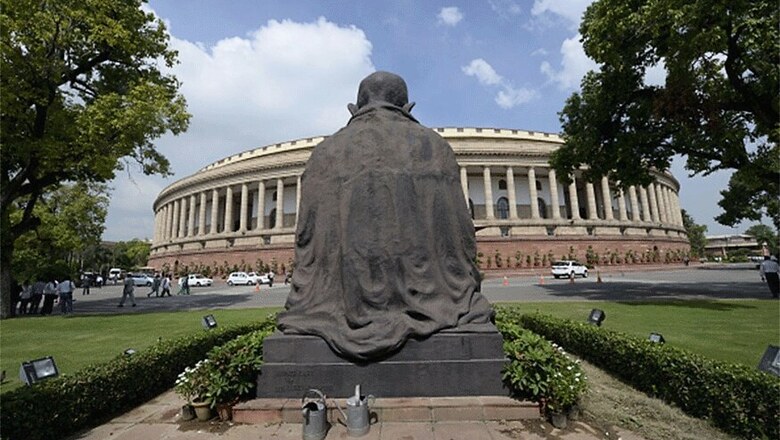
views
New Delhi: As the Monsoon Session of Parliament began on Monday, the government looks set to introduce a host of new Bills. It is also slated to take up 11 pending Bills for consideration and passage.
Though a few significant Opposition parties have decided to take the government head-on during the session on issues like mob lynching, situation in Kashmir and farming crisis, here is a list of crucial Bills which would be debated during the Session:
THE NATIONAL COMMISSION FOR BACKWARD CLASSES BILL 2017
The Bill was passed with huge majority in the Lok Sabha on April 10. A select committee of Rajya Sabha, which looked into the Bill, will be submitting report.
Once the Bill is passed in the Rajya Sabha, the OBC Commission will become as powerful as the National Commission for Scheduled Castes and National Commission for Schedule Tribes. Till date, the OBC Commission is simply a legal body, whose job is to advise the government regarding the inclusion or removal of caste/community lists. The proposed commission will hear the grievances of socially and educationally backward classes, a function discharged so far by the National Commission for Scheduled Castes. It also seeks to insert a new Article 342A to provide that the President may, by public notification, specify the socially and educationally backward classes.
THE BANKING REGULATION (AMENDMENT) Bill, 2017
A Bill to ban unregulated deposit schemes and protect the interests of the depositors is in the frontline. It empowers RBI to move against defaulters under the Insolvency and Bankruptcy Code, 2016. The Bill states that any deposit taker who promotes and accepts deposits in an unregulated deposit scheme may be punishable with imprisonment for a minimum term of two years, which may be extended to 10 years, and with a fine which may extend to twice the amount of aggregate funds collected from subscribers, members or participants in such schemes or arrangements.
THE NATIONAL MEDICAL COMMISSION BILL, 2017
The new Bill proposed by the Union Health Ministry lays down an exit exam, which all MBBS graduates in India will have to clear, to get a license to practice in the country. The exit exam will also serve as a National Eligibility cum Entrance Test for doctors wishing to pursue post-graduate studies. This Bill, which replicates the idea like that of the All India Bar Examination held for advocates, will replace the existing Indian Medical Council Act, 1956, once cleared by the parliament.
FACTORIES (AMENDMENT) BILL, 2017 AND CODE ON WAGES BILL
The labour ministry is likely to push aggressively to pass both these Bills. Both the Bills were passed by Lok Sabha in the last Monsoon Session. The Code on Wages will enable the central government to fix universal minimum wage for all establishments and workers across the country, and the Factories (Amendment) Bill, 2016, will increase the working overtime hours up to 100 per quarter.
The Code on Wages Bill also seeks to empower the Centre to set a minimum wage across sectors and states will have to maintain that. However, states will be able to provide for higher minimum wage in their jurisdiction than fixed by the central government. The proposed Code on Wages will subsume the Minimum Wages Act of 1948, the Payment of Wages Act of 1936, the Payment of Bonus Act of 1965 and the Equal Remuneration Act of 1976.
THE FINANCIAL RESOLUTION AND DEPOSIT INSURANCE BILL, 2017
The Financial Resolution and Deposit Insurance Bill, 2017, is a proposed law to deal with insolvency of banks, insurance companies and other financial services firms and follows the Bankruptcy Code 2016, which deals with bankruptcies of all other companies. This Bill was approved by the Cabinet led by Prime Minister Narendra Modi. It seeks to give comfort to the consumers of financial service providers in financial distress. It also aims to inculcate discipline among financial service providers in the event of financial crises by limiting the use of public money to bail out distressed entities.
THE NABARD (AMENDMENT) BILL, 2017
The Nabard (Amendment) Bill, 2017, was introduced by Finance Minister Arun Jaitley in the Lok Sabha during the Budget session. The bill seeks to amend the present, Nabard Act, 1981. The bill proposes to increase the capital of Nabard from Rs 5,000 crore to Rs 30,000 crore by the government after consultations with the RBI. It also proposes to transfer the central bank’s stake in Nabard to the government.
THE CONSUMER PROTECTION BILL
In August 2015, the Centre had introduced the Consumer Protection Bill in the Lok Sabha to repeal the 30-year-old Consumer Protection Act. The standing committee had also submitted its recommendations in April. The ministry has accepted some of the recommendations of the panel and finalized the draft Bill. This bill will now revamp the 2015 bill as more than 80 changes have been made to it. The committee, among other things, had recommended stringent provisions to tackle misleading advertisement, as well as to fix liability on endorsers and celebrities, and such recommendations have been accepted.




















Comments
0 comment